Suffering from femoral head necrosis but refusing surgery, Mr. Hai self-treated with tobacco products, leading to the disease getting worse, infection, and bedridden for 6 months.
Mr. Vu Dinh Hai (55 years old, Lang Son ) was taken to the Orthopedic Trauma Center, Tam Anh General Hospital System, in early June with severe hip pain, atrophy of the gluteal and lower limb muscles, pressure ulcers on the hips and back, high blood sugar...
He said he had previously visited many places and was diagnosed with femoral head necrosis, requiring a hip replacement for treatment. However, because of concerns about the risk of not being able to walk after surgery and other complications, he and his family refused surgery and tried to treat it with folk remedies. The family sought out whatever good herbalist they could find, from herbal medicine to traditional remedies that had not been tested.
Master, Doctor, Doctor Dang Khoa Hoc said that this created conditions for the disease to develop rapidly. During a year of using traditional medicine, Chinese medicine..., the patient's femoral head necrosis rate not only did not slow down, the pain did not improve, but blood sugar also increased, increasing the risk of infection during surgery.
In addition, because the patient could not walk and had to lie in bed for 6 months, it increased osteoporosis and the risk of blood clots, increased the risk of pneumonia and urinary tract infections. When admitted to the hospital, the patient's femoral head necrosis had developed to the final stage, deforming the socket and femoral head.
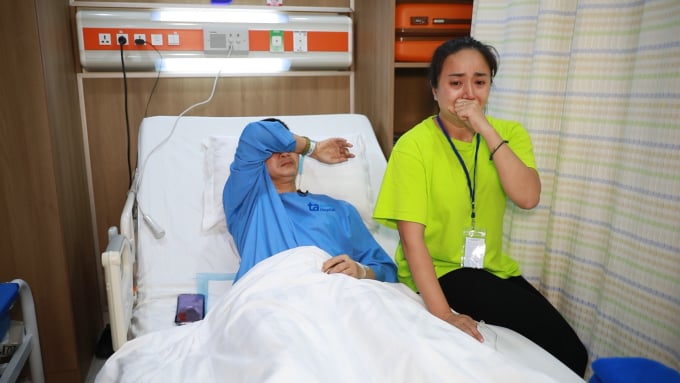
Relatives of the patient emotionally shared about the treatment journey. Photo: Tam Anh General Hospital
After the doctor examined and performed diagnostic imaging tests, the patient was scheduled for surgery to replace both hips at the same time using the SuperPath method. Before the surgery, the patient was prescribed medication by the endocrinologists to stabilize blood sugar.
The SuperPath method has many advantages over traditional surgery. The incision is made through the upper joint capsule, without cutting the muscle or the joint capsule, preserving the tendon system behind the hip joint and the soft tissue around the joint. As a result, the surgery time is shortened, there is less blood loss, and the patient recovers quickly. Usually, one day after surgery, the patient can walk normally with a walker, without much pain.
Ms. Vu Thi Thuy, the patient's daughter, said she was extremely happy to see her father's first steps after many months of lying in bed due to femoral head necrosis. The recovery was beyond the family's expectations. According to the initial prognosis, the patient needed to stay in the hospital for 7 days for monitoring, however, because of his good recovery, after only 4 days, Mr. Hai was discharged from the hospital.
"If I had known that the surgery would be so easy and recovery would be so good, my family and I would have had my father have surgery sooner, avoiding a long period of time traveling everywhere, treating him with traditional medicine, oriental medicine... not only wasting money but also making his condition worse," said Ms. Thuy.
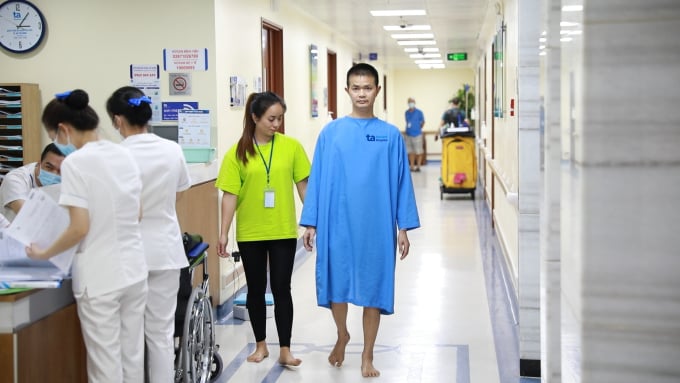
The patient can walk steadily after 3 days of surgery. Photo: Tam Anh General Hospital
Femoral head necrosis is a condition of lack of blood supply, causing bone and cartilage necrosis. When infected, the patient's bone head will gradually become thinner, forming bone cysts, which will gradually cause subchondral fractures, femoral head collapse, and loss of hip function. If not intervened promptly, the patient faces a very high risk of disability. The disease is common in people who use corticosteroids for a long time, abuse alcohol, have dislocated joints, and fractures of the femoral neck...
Femoral head necrosis often has no obvious symptoms in the early stages. As the disease progresses, hip pain will appear, the pain may spread to the inner thigh and become severe when moving or standing for a long time. Patients also have difficulty performing movements such as internal rotation, external rotation, hip extension or adduction, and almost cannot squat.
Femoral head necrosis in Vietnam is showing a tendency to become younger. Many patients who come to Tam Anh General Hospital for hip replacement due to femoral head necrosis are of working age, 30-45 years old.
Science doctors recommend that for femoral head necrosis, if it has developed to stage 3 or 4, with femoral head deformities affecting the acetabulum, the patient should have surgery when prescribed by a doctor. Studies have shown that at this stage, medical treatment with drugs, stem cells, etc. is no longer effective, causing a delay in treatment. In addition, although femoral head necrosis does not lead to death, the inability to walk for a long time can cause very serious complications such as blood sugar disorders, lung infections, urinary tract infections, lumbar ulcers, sepsis, thromboembolism, etc., which can threaten the patient's life.
Phi Hong
Source link


![[Photo] Prime Minister Pham Minh Chinh and Prime Minister of the Kingdom of Thailand Paetongtarn Shinawatra attend the Vietnam-Thailand Business Forum 2025](https://vphoto.vietnam.vn/thumb/1200x675/vietnam/resource/IMAGE/2025/5/16/1cdfce54d25c48a68ae6fb9204f2171a)





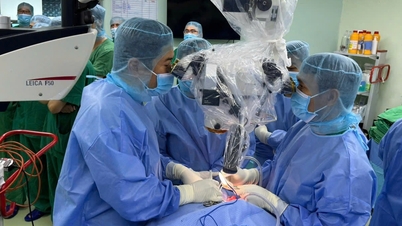

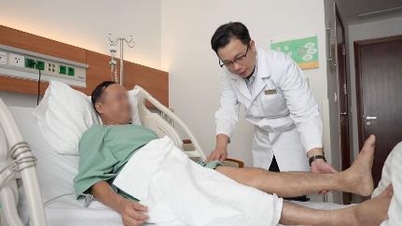

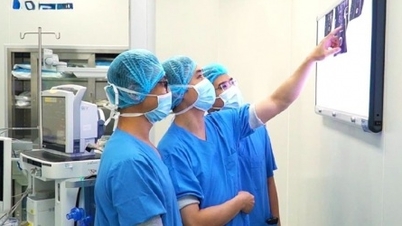

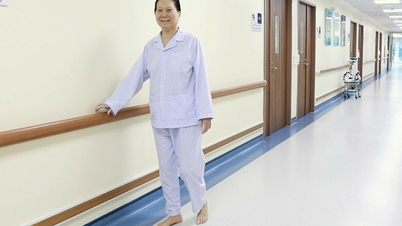
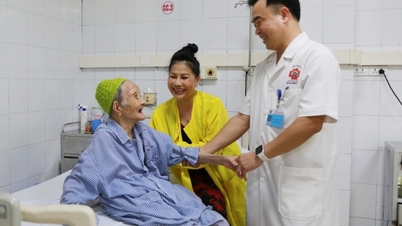



















![[Photo] President Luong Cuong receives Prime Minister of the Kingdom of Thailand Paetongtarn Shinawatra](https://vphoto.vietnam.vn/thumb/1200x675/vietnam/resource/IMAGE/2025/5/16/52c73b27198a4e12bd6a903d1c218846)





























































Comment (0)